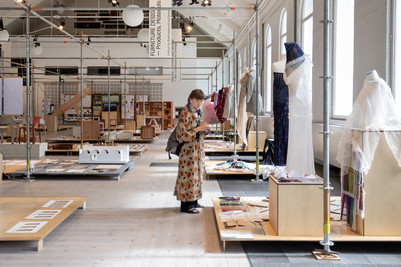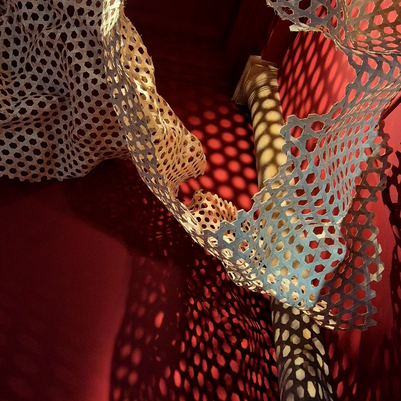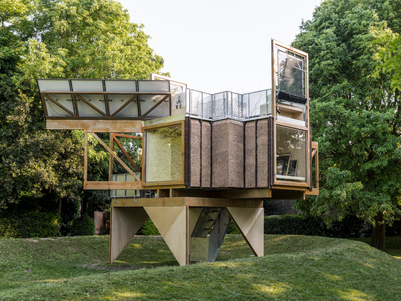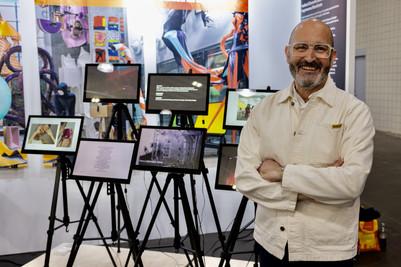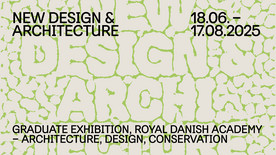

About the programme
The programme is a 2-year Master's programme at the Royal Danish Academy - Architecture. Read more about the programme's academic content and structure here.
Subject and Content
Subject and Content
The struggle against destructive modes of existence in a world off balance remains the most critical and vexing concern of our time. Today’s dominating political and economic order appears too preoccupied with preserving itself to take on political projects in favor of real changes towards a less lethal more livable earth committed to securing multi-species livelihoods. In the face of growing frustrations and bitter divides, future architects must work all the more inquisitively and creatively to develop site-sensitive architectural breakthroughs for palpable change.
Political architecture relates critically to sustainability goals, certificates, and green talk. It looks beyond mainstreamed solutions for grounded commitment. We can do better. Future architects can become more politically active through their profession and through the very spaces of architecture. The profession must realize its political responsibility much more than it does today and act accordingly.
How to study Political Architecture?
What can architecture do? It is a grand question. We do not expect grand answers. We encourage students to engage with the world outside the Academy, contemplating, even attempting small real-world transformations. Collaboration, dialogue, activism, exhibiting, and petitioning is part of 'Political Architcture: Critical Sustainability' everyday.
But there is equally room for pursuing more idiosyncratic and introvert paths of study.
Building on the legacy of the Academy as an art academy, MA students are expected to engage in their work with a high degree of independence
– to be self-driven in terms of pursuing core interests and developing an independent engagement with architecture. However, at 'Political Architecture: Critical Sustainability' independence does not equal individualism. During one of the four MA semesters, students will work together two-and-two, and collaborations are generally encouraged.
Students engage with building practices in many ways - through spatial transformation, vibrant materials, ‘alegal’ building codes, collaborative tectonics, twisted typologies and through political resetting and recombining of scales: new scales of economy, organization, and labor, meeting unconventional scales of ownership, function, visibility or habitation. The transitional process into mastery will be guided and supported through longer weekly individual conversations/tutorials with a regular personal tutor. A consequence of this pedagogical model is that studies are tutorial-based more than curriculum-based.
Fieldwork
A defining feature of the Political Architecture program is the annual fieldwork campaign. This mandatory excursion provides us with architectural complexity, urgency, and a political context. The fundamental purpose of fieldwork is: 1) to select and explore a concrete political situation of complexity and urgency; 2) to discover and construct individual project contexts, rich enough to feed co-evolutionary project work throughout the academic year.
Co-evolutionary Project Work
The general method we adopt at 'Political Architecture: Critical Sustainability' is twofold: on the one hand, a practical, material, and constructive approach; on the other an analytical, conceptual and academic mode of inquiry. Though the approaches are intertwined, their dual capacities are kept separate, feeding off each other in a co-evolutionary process.
This co-evolutionary approach centers on a process of parallel interaction through two-fold paths of investigation, one pursuing academic ‘thinking through scholarly method’, the other developing architectural proposition from ‘heuristic thinking through material production’. Students will begin to probe for creative potentials in connections and distinctions between academic work and architectural design processes.
A polyrhythmic structure characterizes the programme: lectures, individual tutorials, workshops, roundtables, fieldwork, collaborations, and seminars interweave to establish a type of project and research development practice that support the Co-evolutionary Project Work.
Structure
Structure
Education at the programme is structured after an annual cycle. Usually, students work for a full academic year on developing a single project. The fieldwork expedition takes place in October. MA-students at first and second year collaborate during the weeks leading up to the fieldwork, engaging in preparatory workshops and desk research.
During and after this period, group work is highly encouraged and sometimes a demand for first-year students while optional for second-year students. Throughout the fall semester, second-year students follow a mandatory parallel course in academic writing (Writing Architecture).
During the spring, our first- and second-year students follow separate paths. While the latter pursue their final diploma thesis project, the former are introduced to a string of events, workshops, lecture series, seminars etc.
At the end of the spring semester the first-year students engage in extrovert activities with their project, which takes the form of an exhibition, seminar, or workshops, where the project in a more developed form is brought back to its real-world context and the involved stakeholders, strengthening the situated and engaged aspects of the project. Measuring the potential impact of one's work by its impression on those to whom it matters is of great value to students, but it is also a token of gratitude to the communities who have shared and helped us to understand. On the heels of the spring semester, it is customary for students to collect and publish their production in a printed volume.
Course Description
Course Description
Constructing Context
Based on desk research, fieldwork, and input from external collaborators, students construct individual project contexts suggesting that context is not a given but is rather a construct based on a curation of the given – what to foreground in and of the given. Context construction will be student driven – reflecting personal interests and concerns mirrored in local findings, conceptual, material, political, historical, architectural, technological or socio-/anthropological. As a part of Constructing Context, a workshop on site registration and mapping will be conducted in preparation for the fieldwork.
Fieldwork (approx. 3 weeks)
Ideally, students share accommodation at the destination making it easy to hold meetings, crits, and collaboration events. Connections are made with local academics, architects, and other stakeholders to facilitate entryways into local conditions. All mandatory parts of the fieldwork are planned with utmost concern for student economy. All personal fieldwork transport, food and accommodation costs are borne by the individual student.
Co-evolutionary Project Work
In the beginning of the spring semester, first-year students begin to explore 'Co-evolutionary Project Work', one of the key parts of the Political Architecture: Critical Sustainability curriculum. Co-evolutionary Project Work is a way of ‘walking on two legs’: a writing practice working with discursive elements (conceptual, analytic, theoretical, academic, scientific) in parallel with, yet in reciprocal relation to a spatial practice working with nondiscursive elements (situated, visual, bodily, spatial, material, living). The full realisation of a co-evolutionary work process results in two outcomes: an architectural design project and an academic paper.
Architectural Proposition After fieldwork, students examine their findings in view of furthering both research and project development. Students work with sharpening individual projects through sketch proposals, examination of political context, developing a critical program and iterative construction of an exploratory proposition for a chosen site.
Writing Architecture
During the fall semester, second-year students are taught the basics of academic research practices and writing techniques through a series of seminars, lectures, and exercises. Understanding the rationale and the interdependencies of research question, state-of-art, method, theory, analysis, etc., is key not only to read and assess academic research literature but also for embarking on a possible academic research career.
Language
Language
The programme language is English.




